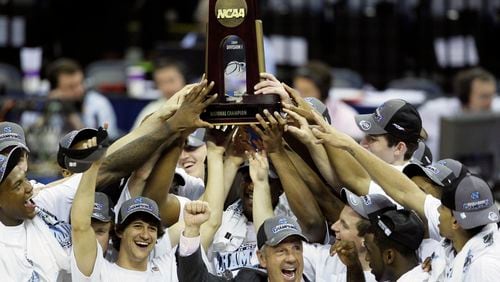Well, at least it's official now: When it comes to creating and enforcing structures and rules for intercollegiate athletics, the NCAA is useless. Just close the doors now so we can end this charade.
North Carolina for years has committed academic fraud, primarily in the form of bogus African Studies courses that helped keep athletes eligible. That fact is clear to almost everybody. But after a long, drawn-out investigation that the NCAA never seemed to want to be a part of, the body announced Friday that the committee on infractions "could not conclude North Carolina violated NCAA rules."
So the Tar Heels will not receive any punishment.
No championships will be vacated. No scholarships will be lost. No bowl ban. No long walk of shame for Roy Williams and any other UNC coach complicit in this.
Nothing.
Why? This is the best part.
From the NCAA's statement: "NCAA policy is clear. The NCAA defers to its member schools to determine whether academic fraud occurred and, ultimately, the panel is bound to making decisions within the rules set by the membership."
Let me translate: If North Carolina doesn't believe academic fraud occurred, then academic fraud didn't occur. What a great standard that would be for our judicial system.
The NCAA said there's nothing they can do about it. They said because the bogus courses were technically offered to the general student body, anybody could have signed up for African Studies 101 and received an "A" for doing somewhere between next-to-nothing and actually nothing.
Something tells me this isn't how North Carolina became one of the nation's top academic institutions. But I'll leave it to the actual professors to throw their desks through the window.
More from the NCAA: "While student-athletes likely benefited from the courses, so did the general student body. Additionally, the record did not establish that the university created and offered the courses as part of a systematic effort to benefit only student-athletes."
All together now: bull.
The NCAA began an investigation into the football program in 2010 and it grew from there. North Carolina eventually was charged with five "Level I" infractions, including lack of institutional control.
Classes in the African and Afro-American studies department helped a number of athletes from 2002 to 2011. They were independent-study courses. There were no lectures. They never met. They required one or two papers. That's it.
SEC commissioner Greg Sankey, who chairs the committee on infractions said, "The (COI) is in no way supporting what happened."
That's special.
I would say this is another black eye for major college athletics. But to paraphrase an old line, college athletics ran out of black eyes 50 years ago.
The NCAA won't confirm what everybody else knows: Those courses were created to keep athletes eligible, to win games and championships, to create mind-boggling revenue steams. That's not at all to suggest that all athletes are dumb or academically challenged. They aren't. But it goes without saying that if some individuals did not have amazing athletic skills, they would not be admitted to a school like North Carolina. Borderline academic students who aren't athletes generally don't get in. But the university knows helping athletes through the front gates benefits them in other ways. That's fine, as long as the means aren't, well, ridiculous.
We've known this for a while, but it was affirmed with this decision: The NCAA has ceased to be useful. They're complicit in this crime -- and, yes, crime is an appropriate word because these practices allow universities to stray from their stated mission, of setting the bar high and nurturing young people. Enabling is not nurturing.
As bad as the NCAA has looked in the past, this decision might be the worst of all. Because even in the best-case scenario of its own rules preventing them from acting, then their own rules render their existence meaningless.
EARLIER: Weekend Predictions parlay: NCAA over Auburn, Johnson over Richt
Subscribe to the, "We Never Played The Game" podcast with the AJC's Jeff Schultz and WSB's Zach Klein on iTunes. Episodes also can be downloaded from on-demand link on WSBRadio.com.
- Weekend Predictions parlay: NCAA over Auburn, Johnson over Richt
- If Braves serious about cleaning up mess, they'll make changes at top
- Overreaction Monday: Dogs No. 4 -- they're in playoffs! (Not really)
- It's clear: Georgia (6-0) is really good and quarterback situation is settled
- Weekend Predictions: Georgia (Carrie) gets homecoming revenge
- Braves keep Snitker, because they don't need another inferno now
- John Coppolella never grew into job and damaged Braves need leadership
- John Coppolella resigns and Braves look like they're in disarray
- Overreaction Monday: Next two weeks will be telling for Georgia QBs
- Georgia has another lopsided win, and this team looks like real deal
- Arthur Blank, Falcons to have open discussion on race, protests
- Weekend Predictions: Georgia knows Knoxville misery, I know fasting misery
- Pitino brought 'Kentucky's shame' to Louisville: Firing was deserved
- Forget Eason-Fromm debate: It may not matter who starts for Georgia
- Overreaction Monday: There's an obsession over QBs -- go figure
- Falcons hold on to win (barely) in unusual way on an unusual day
- Free blog: Arthur Blank speaks out, as sports, politics continue to intersect
- Fumbles aside, Georgia Tech has loud response for Pitt, Narduzzi
- It's Trump vs. NFL (and Warriors and LeBron)! Can't #StickToSports
- Weekend Predictions: Dogs, Falcons winners, James Franklin a loser
- Georgia, Georgia Tech head into conference play with uncertainty
- Overreaction Monday: Falcons (2-0), Georgia (3-0) can't lose ... ever!
- Florida wins ugly over Tennessee, but Georgia emerges as real winner
About the Author






